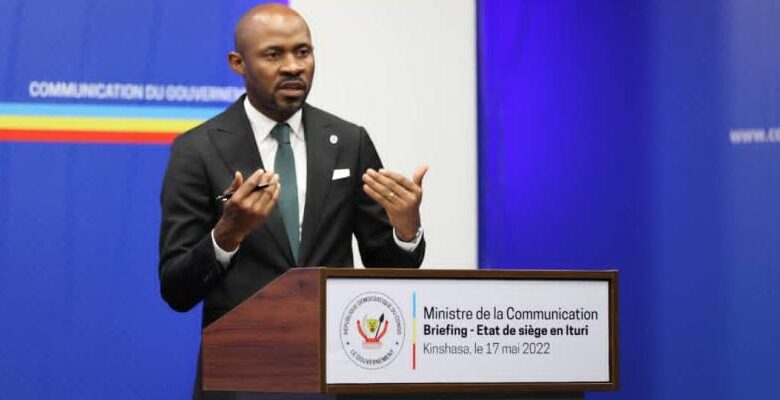DRC Gov’t Promises Hard Times For Unrepentant Armed Groups
The Democratic Republic of Congo says rebel groups that do not adhere to current peace initiatives would be hit very hard.

The Democratic Republic of Congo says rebel groups that do not adhere to current peace initiatives would be hit very hard.
“Right now, there is no question of negotiating whatsoever, as I have heard some people say,” DR Congo’s Minister of Communication, Patrick Muyaya said.
Muyaya spoke during a joint briefing with the military governor of Ituri, Lt.-General Johnny Luboya Nkashama on Wednesday, May 17.
“There are no negotiations. There are consultations which are being carried out because there are compatriots who must be listened to so that eventually we start accepting them. The future awaiting them is the Disarmament, Demobilisation and Reinsertion (DDR) process.”
“Things are no longer as in the past when once you belong to an armed group and present yourself, you are immediately integrated into the national army. No. Here, there is a process that permits you to be reinserted into civilian life.”
“In this envisaged process, there is a political process which has started with consultations which are going on because there are other groups, which because of logistics needs, could not be present in Nairobi.
” I believe there will be a round of consultations which concerns them. After that, those who do not participate in the peace process would be hit very hard. They will be crushed.”
The minister said the government’s objective in the beginning of the consultation process in Nairobi, Kenya with different armed groups, is to bring peace to the eastern DR Congo and those who accept to lay down their arms would be inserted in the DRR process.
“The government, the president of the republic has stretched a hand to those who want to join the peace dynamic,” he said.
“Right now, I have to recall and everybody surely knows that the problem of armed groups is a problem which has existed before the arrival of the president of the republic as head of state of the DR Congo, and that is part of the heritage that we assume due to the continuity of the state.”
“Whether it concerns the state of siege or the consultations going on now or other measures, the objective that we are searching for is peace because sixty-one years after independence, we cannot continue to kill ourselves whereas Africa and the entire world are waiting for responses from us.”
Concerning the consultation process, Muyaya revealed that the presidents of Tanzania and South Sudan whom President Tshisekedi had met, would equally be involved.
“You heard on April 8 that there are two conclaves in Nairobi. The president of the republic on April 8 went to append his signature on the instruments that would permit our formal adhesion to the Community of East African States (CEAS), and you saw that after this first meeting on April 8, there was a conclave of heads of state on April 21 which brought together five heads of state of the sub region.”
Support Our Journalism
There are millions of ordinary people affected by conflict in Africa whose stories are missing in the mainstream media. HumAngle is determined to tell those challenging and under-reported stories, hoping that the people impacted by these conflicts will find the safety and security they deserve.
To ensure that we continue to provide public service coverage, we have a small favour to ask you. We want you to be part of our journalistic endeavour by contributing a token to us.
Your donation will further promote a robust, free, and independent media.
Donate HereStay Closer To The Stories That Matter




